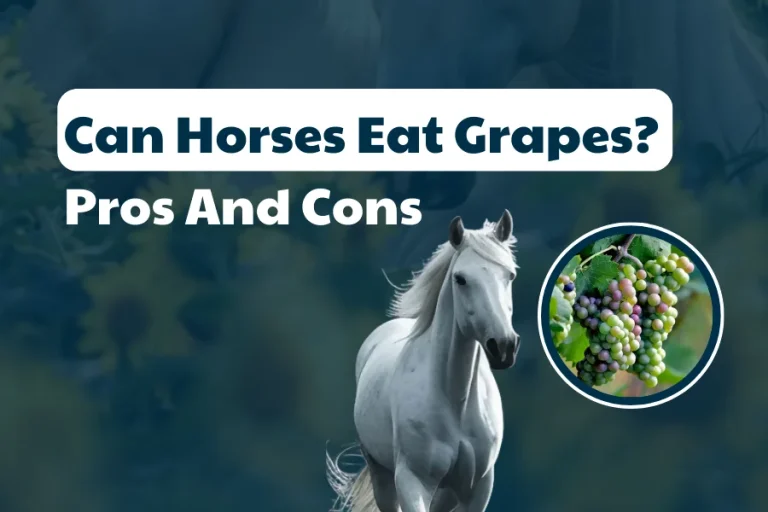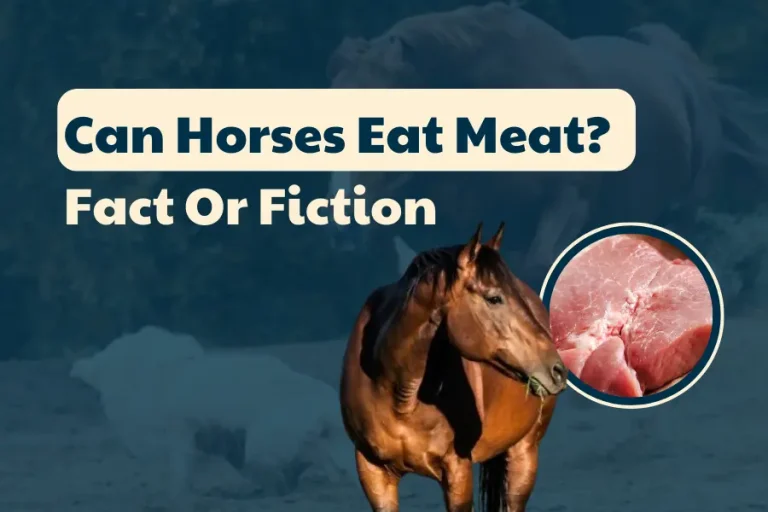Can Horses Eat Apples? What Every Owner Should Know
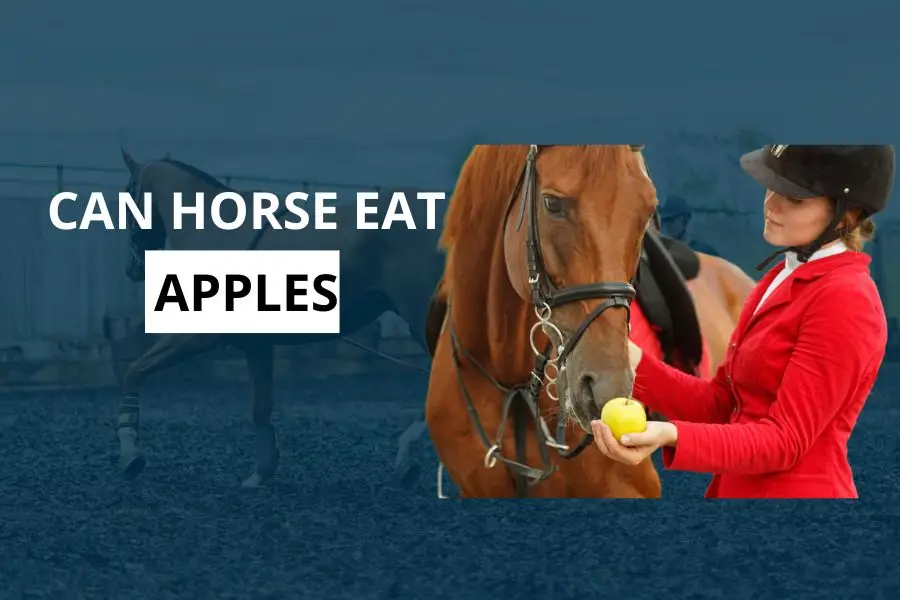
Like other animals, horses also enjoy taking treats. They can be rewarded with treats to enhance the bond, and there are so many fruits and vegetables such as cucumber, carrots, oranges, or pears,… that they can enjoy.
So, can horses eat apples?
If you are interested in this, then this article is for you. Before incorporating any type of food into your equine’s diet, understanding both the benefits and downsides is crucial. This article gives the reader a clear understanding of feeding apples to horses.
Can Horses Eat Apples?
Yes, horses can eat apples are perfectly suitable for feeding horses occasionally, as long as they are fresh, washed, and given in limited quantities. Avoiding overfeeding is crucial because the fruit has a high sugar content, which would cause digestive problems.
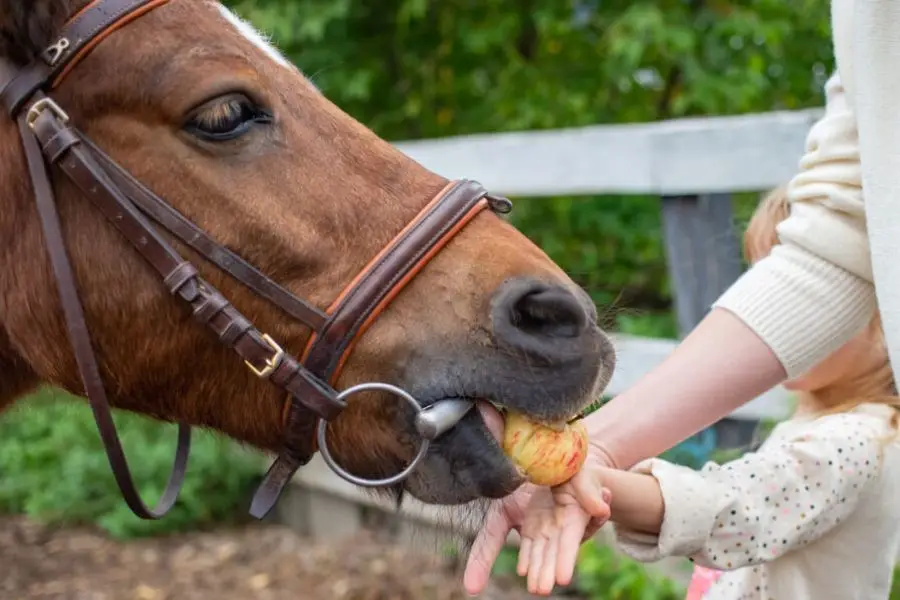
In most cases, apples are a good snack, and many horses like them. They are packed with vitamin A, which is good for vision, immunity, red blood cells, and vitamin C, a strong antioxidant. Apples are also a good source of potassium which is required for muscular purposes and fiber that aids the functioning of the digestive system.
Horses can eat any type of apple and there are many of them, red, yellow, or green. Supermarket apples that are safe for horses include Granny Smith, Fuji, Red Delicious, and Pink Lady.
The Pros and Cons of Feeding Apples to Horses
When finding out whether can horses eat apples, you should know some of the pros and cons of giving apples to horses can be summarized below:
| Pros | Cons |
| Rich in vitamins and minerals | Potential choking hazard |
| Source of fiber | High in sugar |
| Hydrating | Stomach upset |
| Low in calories | Seed toxicity |
| Helps with boredom | Pesticide residue |
Even though apples are a good source of vitamins and minerals risks involved in feeding these fruits to horses.
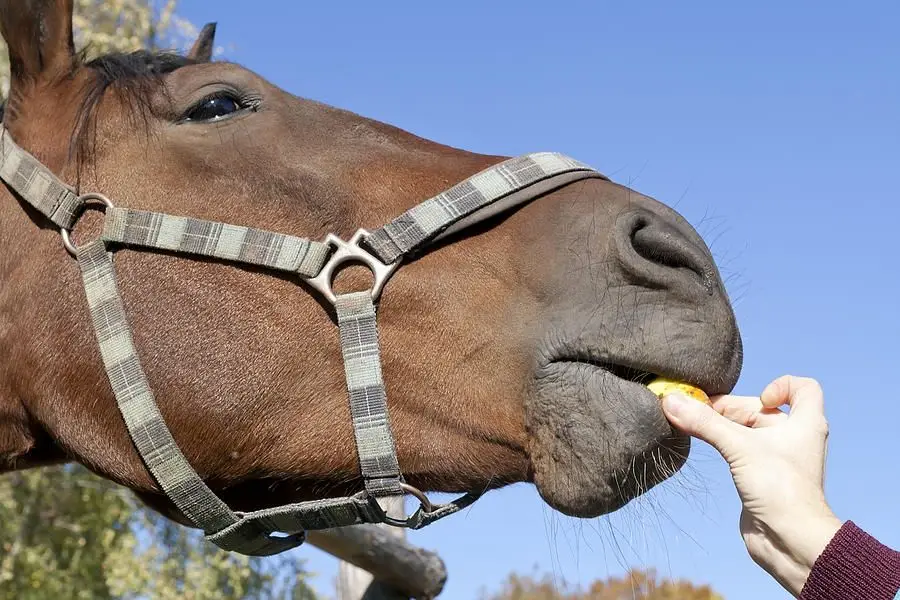
Pros of Apples for Horses
Giving apples to our horses is very advantageous in many ways not to mention that horses love the tangy taste of apples. Here are some key advantages of feeding apples to horses:
- Rich in Vitamins and Minerals: Vitamin A and C, potassium, and many others are found in plenty in apples. These nutrients assist in improving immunity and also play and critical role in the proper functioning of the heart. Also, apples are a source of fiber and fiber in the diet of horses helps in the digestion process.
- Natural Source of Energy: Apples are natural energizers for the equines due to their natural component, which contributes to the provision of energy to the horses. The sugar present in apples is a raw sugar or a complex carbohydrate and can be utilized to produce energy and hence can be effectively served before races or exercise sessions. Apples also contain fructose slow-acting carbohydrate or rather sugar that can prove useful during extended activity.
- Loaded with Antioxidants: Antioxidants are found in apples and these play a significant role in boosting the health of a horse from diseases. For example, vitamin C found in apples helps in combating infections. These characteristics also help in the faster heal-time after exercise due to the antioxidant actions.
Cons of Feeding Apples to Horses
Although apples are healthy and tasty for most horses, some points can become dangerous. You must know these risks that may harm the health and safety of your horses.
- Weight Gain and Obesity: This is from the natural sugars in apples which, if given in excess can easily lead to weight increase and obesity. Laminitis, metabolic disorders, and many other issues are potential complications experienced by overweight horses.
- Choking Hazard: Whole apples or large pieces can potentially cause choking in a horse in case the animal attempts to swallow the food without proper chewing. Therefore, always chop apples into smaller pieces to minimize the chances of your horse swallowing big chunks of the fruit whole.
- Digestive Disruption: As mentioned, horses are very sensitive in terms of eating habits and can easily get digestive tract disorders. This is why it is important to slowly introduce apples in small portions to avoid such complications as colic or diarrhea.
- Health Conditions: Animals with special health problems, including those with hormonal imbalances or those that have been treated for laminitis, should be kept under close watch as far as feeding is concerned. Histapaste, even the natural sugars contained in apples may not be good for such horses and one has to advise his/her veterinarian before feeding apples.
Any changes to a horse’s diet should be made under the supervision of a vet to ensure the horse’s health remains the priority, while still allowing occasional treats like apples.
How To Feed Your Horse Apples
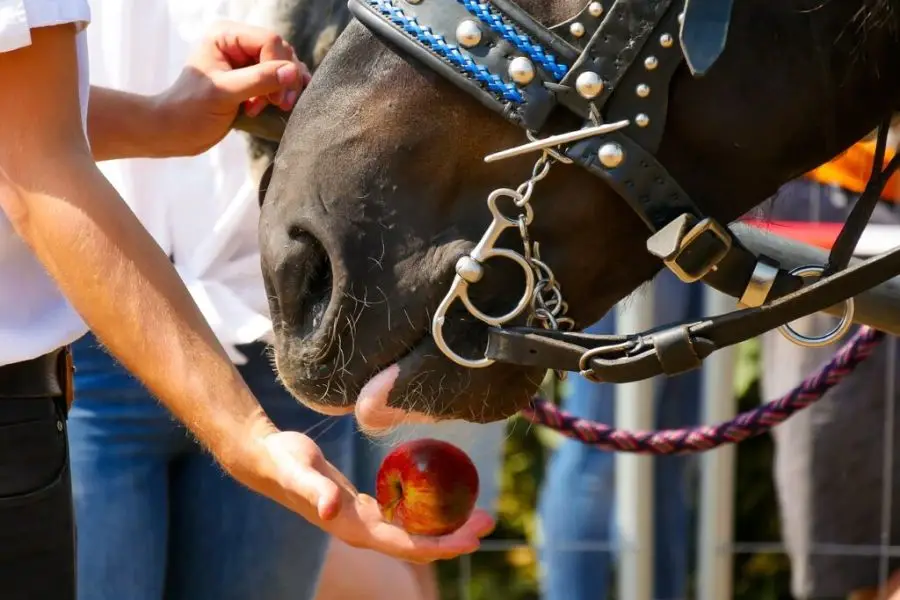
When it comes to can horses eat apples, you will realize that horses also love whole apples or apples which are sliced into two but there are several other good ways of preparing apples to be fed to horses.
Mixed with Feed: Core and cut apples into chunks and then feed them to the horse in its feed or bran mash. This makes it more special when it comes to their meals.
Baked Apples: Stewed apples are delicious and should prove ideal for old horses or those with weak teeth since the apples have to be baked. Accompanying the baked apples with small pieces is also important because they have been baked.
Homemade Apple Horse Treats: One way to be able to pamper your horse is to prepare some apple treats by yourself at home. Apples may be combined with such ingredients as oats, carrots, molasses, bananas, and pumpkin puree.
Applesauce: Applesauce can be eaten in its raw form or added to the feed offered to the birds. Many elderly horses with dental problems can benefit from it, and in some cases, drugs can be given through the paste. You can walk around a supermarket and look for a sugar-free applesauce which will be beneficial for your horse.
When Not to Feed Horse Apples
Can horses eat apples? Note that apples can be a good snack for horses, but not for all horses. Apples are also not friendly for horses with conditions such as insulin resistance since the fruits contain sugar.
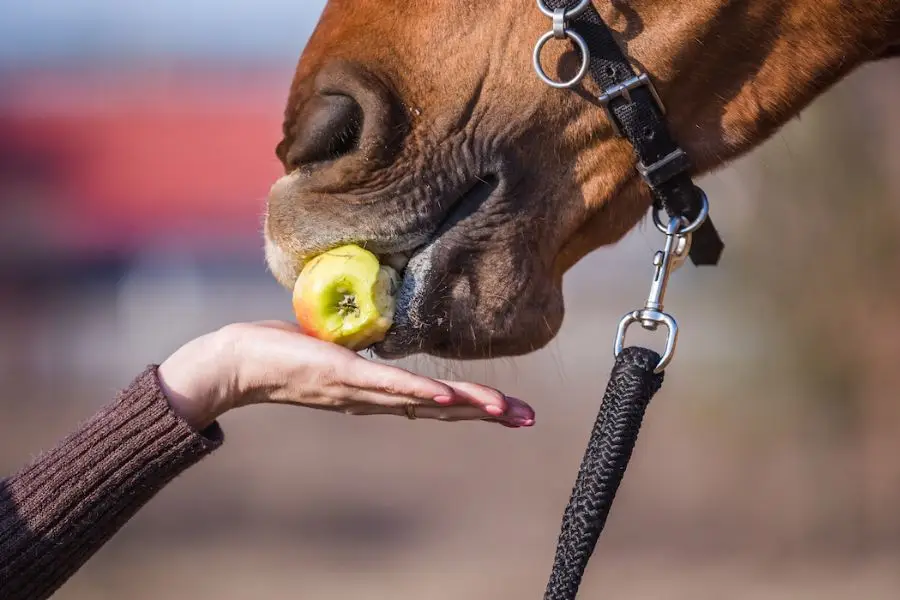
Additionally, mention that apples contain potassium, so their administration to horses with Hyperkalemic Periodic Paralysis (HYPP) is prohibited. Besides, apples should be avoided with horses that have issues such as Insulin Resistance (IR), Equine Metabolic Syndrome (EMS), and Cushing’s disease. But always seek advice from your veterinarian if you are in any doubt about any kind of treat you wish to feed your horse.
FAQs
Yes, horses can eat apple peels but should not be given in large quantities as apple seeds can be toxic to them. In contrast, when you offer apples to horses they can eat both the pulp and the skin without any harm. They possess muscular teeth and jaws that are capable of grinding the skin well. However, if you desire to peel the apples for your reasons as much as we do, then we are fine with that. Remember that peeling apples may take more time, especially since horses tend to gobble down food rapidly.
Apple seeds contain some quantity of amygdalin that has the potential to convert to hydrogen cyanide, a poisonous compound. Although the seeds are not likely to be fatal if ingested by horses, it is still unadvisable to offer apples with seeds as treats as it would take a lot more than a couple of seeds to harm the horse. A small number of seeds in an apple treat is not a big issue and it should not be a cause for alarm, but precaution is advised.
Yes, horses are capable of consuming unripe apples, but ripe apples are much more appealing to horses because of their sweetness and digestibility. Green apples may have a very sour taste and are not preferred by horses. If you consider serving unripe apples, make sure they are fresh and washed well.
Yes, you can feed horses with whole apples. Healthy adult horses have no issues swallowing a whole apple. Although apples should ideally be fed whole to horses, for older horses with dental problems or young horses whose teeth are yet to fully erupt, it is advisable to cut the apples into smaller sizes.
Yes, they are aware that horses can choke on apples especially those that are known to have the habit of overeating. Despite having robust teeth, some horses may force it to swallow whole apples or even huge portions which may lead to some degree of choking. In case you have a horse that easily chokes on apple cores, it is recommended to chop the apples into smaller portions.
Final Thoughts
To address the original question—can horses eat apples—the answer is yes! However, apples are a safe and healthy treat for your horse, and most of the horses eat them. But it’s important not to over-feed with apples too because this can cause some problems in the tummy, so portions should be controlled to just several pieces.
Overall, apples are useful, but their consumption may also have certain negative implications. For owners who are seeking to change the diet of their horses, consulting your veterinarian is highly recommended. They are also useful in telling you when apples are right for your horse which as a rule is most of the time and how many you should give.

